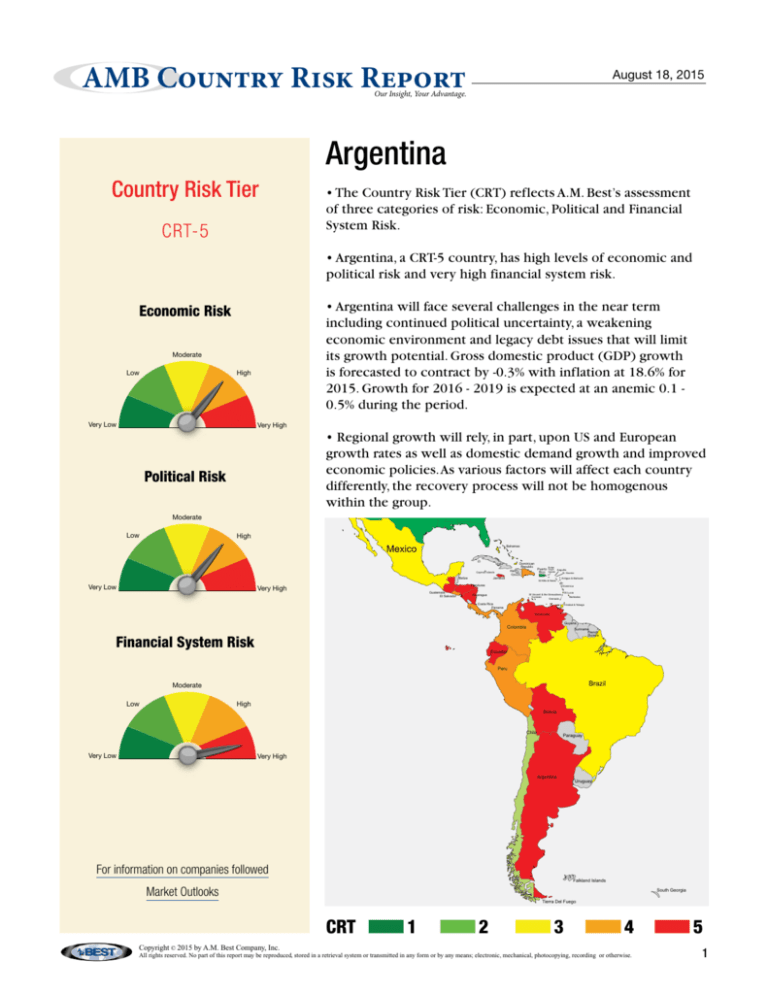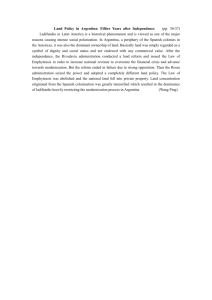
AMB Country Risk Report
August 18, 2015
Our Insight, Your Advantage.
Argentina
Country Risk Tier
CRT-5
• The Country Risk Tier (CRT) reflects A.M. Best’s assessment
of three categories of risk: Economic, Political and Financial
System Risk.
• Argentina, a CRT-5 country, has high levels of economic and
political risk and very high financial system risk.
• Argentina will face several challenges in the near term
including continued political uncertainty, a weakening
economic environment and legacy debt issues that will limit
its growth potential. Gross domestic product (GDP) growth
is forecasted to contract by -0.3% with inflation at 18.6% for
2015. Growth for 2016 - 2019 is expected at an anemic 0.1 0.5%Canada
during the period.
Economic Risk
Iceland
Greenland
Moderate
Low
High
Very Low
Isle of Man
Irela
Very High
Guerns
• Regional growth will rely, in part, upon US and European
growth rates as well as domestic demand growth and improved
economic policies. As various factors will affect each country
United
differently,
theStates
recovery process will not be homogenous
within the group.
Political Risk
Portugal
Azores
Moderate
Low
Jer
Gibraltar
M
Canary
Islands
High
Mexico
Bahamas
Very High
Puerto
Rico
Haiti
Cayman Islands
Belize
Very Low
Western Sah
(Occupied by Moro
Dominican
Republic
Cuba
Jamaica
British
Virgin Anguilla
Islands
St. Maarten
St Kitts & Nevis
Honduras
Guatemala
El Salvador
Mauritania
Antigua & Barbuda
Cape Verde
Dominica
Nicaragua
St Vincent & the Grenadines
Curacao
Grenada
Costa Rica
Panama
St Lucia
Gambia
Barbados
Guinea-Bissau
Trinidad & Tobago
Guinea
Sierra
C
Leone
Venezuela
Guyana
Colombia
Financial System Risk
Liberia
Suriname
French
Guiana
Ecuador
Peru
Brazil
Moderate
Low
High
Bolivia
Chile
Very Low
Paraguay
Very High
Argentina
Uruguay
For information on companies followed
Falkland Islands
Market Outlooks
Senegal
South Georgia
Tierra Del Fuego
CRT 1 2 3 4 5
Copyright © 2015 by A.M. Best Company, Inc.
All rights reserved. No part of this report may be reproduced, stored in a retrieval system or transmitted in any form or by any means; electronic, mechanical, photocopying, recording or otherwise.
1
AMB Country Risk Report
Argentina
Regional Summary: Latin America
• Economic growth is expected to
slow in 2015 before staging a moderate
recovery in 2016.Weakness in the region is
concentrated with commodity exporters
where falling global commodity prices have
compounded country specific challenges.
• Macroeconomic challenges affecting
the region include exchange rate volatility,
currency depreciation, the potential
consequences from the normalization
of U.S. monetary policy and the need to
address structural problems in order to
raise investment and jobs creation.
• Access to capital markets and cost of
financing vary widely across the region.
• While governments vary widely across
the region they all deal with a moderate
amount of corruption and the need
for improved transparency. Increased
and improved government regulation
and enforcement in recent years has
attempted to combat these issues.
Vital Statistics 2014
Nominal GDP
Population
GDP Per Capita
Real GDP Growth
Inflation Rate
Premiums Written (Life)
Premiums Written (Non-Life)
Premiums Growth (2013 - 2014)
Country Risk Tier
CRT-5
CRT-3
CRT-2
CRT-4
CRT-4
CRT-5
Argentina
Brazil
Chile
Colombia
Peru
Venezuela
Source: IMF, Axco, Swiss Re and A.M. Best
Economic Growth
• Argentina is rich in natural resources,
has a large agricultural sector and benefits
from a well-educated work force. It is one
of South America’s largest economies.
• Fiscal deficits, as a result of loose and
unpredictable monetary policy, has
hurt investor confidence. Additional
factors that have hindered investment
include a lack of transparency, increasing
regulations and restrictive fiscal policy.
540.16
42.0
12,873
0.5
21.4
2,998
12,847
-6.5
Regional Comparison
Economic Risk: High
• Restrictive capital and import controls
have been in place since 2011 and will
be difficult to unwind.The controls were
put into place in order to support the
currency and reduce inflation, however,
accommodative monetary policy
continues to put upward pressure on
prices, distorting market forces.
USD bn
mil
USD
%
%
USD mil
USD mil
%
25
Real GDP
CPI Inflation
20
15
%
10
5
0
2006
2007
2008
2009
2010
2011
2012
2013
2014
2015
2016
2017
2018
2019
2020
-5
Source: IMF World Economic Outlook and A.M. Best
2
AMB Country Risk Report
Argentina
Political Risk: High
Political Risk Summary
• President Kirchner took office in
December of 2007 and won re-election
in 2011.The constitution limits the
presidency to two terms.The presidential
election will be held in October 2015 and
remains a key factor in the high level of
political uncertainty.
Score 1 (best) to 5 (worst)
Argentina
World Average
International Transactions
Policy
5
4
Legal System
Monetary Policy
3
2
1
Regional Stability
• The next government will inherit a
challenging economic environment that
includes capital, import and currency
controls.The July 2014 default, while
technical, continues to have an adverse
impact on the economy by limiting access
to global financial markets.
Fiscal Policy
0
Social Stability
Business Environment
Government Stability
• Political tension, particularly involving
labor unions, contributes to instability
in Argentina including incidents of
street protests and massive strikes. The
increased government regulation of
prices including electricity, food, water
and retail gas distribution, will further
unrest. High crime and poverty rates
remain key social issues.
Labor Flexibility
Source: A.M. Best
GDP Per Capita and Population
for Selected Countries
Financial System Risk: Very High
250
16,000
GDP Per Capita
Population
14,000
200
12,000
150
Millions
USD
10,000
8,000
100
6,000
4,000
50
2,000
0
Argentina
Brazil
Source: IMF and A.M. Best
Chile
Colombia
Peru
Venezuela
0
• The Superintendency of Insurance is
responsible for insurance supervision
in Argentina.
• Regulation requiring insurance
companies to repatriate all capital, make
mandatory investments in Argentinian
infrastructure projects and only use
domestically domiciled reinsurance
companies has hampered the industry’s
ability to manage liquidity and risk.
• Restoring access to international
markets through rectifying the sovereign
default will remain an important step in
stabilize the economy.
• Economic reporting is suspect as the
methodology used to calculate statistics
has attracted criticism by the IMF.
3
AMB Country Risk Report
Argentina
GUIDE TO BEST’S COUnTry rISk TIErS
A.M. Best defines country risk as the risk that country-specific factors could adversely affect the claims-paying ability of an insurer. Country risk is
evaluated and factored into all Best’s Credit Ratings. Countries are placed into one of five tiers, ranging from “CRT-1” (Country Risk Tier 1), denoting
a stable environment with the least amount of risk, to “CRT-5” (Country Risk Tier 5) for countries that pose the most risk and, therefore, the greatest
challenge to an insurer’s financial stability, strength and performance.
A.M. Best’s Country Risk Tiers are not credit ratings and are not directly comparable to a sovereign debt rating, which evaluates the ability and
willingness of a government to service its debt obligations.
Country risk Tiers
Country risk Tier
Definition
CRT-1
Predictable and transparent legal environment, legal system and business infrastructure; sophisticated financial
system regulation with deep capital markets; mature insurance industry framework.
CRT-2
Predictable and transparent legal environment, legal system and business infrastructure; sufficient financial system
regulation; mature insurance industry framework.
CRT-3
Developing legal environment, legal system and business environment with developing capital markets; developing
insurance regulatory structure.
CRT-4
Relatively unpredictable and nontransparent political, legal and business environment with underdeveloped capital
markets; partially to fully inadequate regulatory structure.
CRT-5
Unpredictable and opaque political, legal and business environment with limited or nonexistent capital markets; low
human development and social instability; nascent insurance industry.
Country risk reports
A.M. Best Country Risk Reports are designed to provide a brief, high-level explanation of some of the key factors that determine a country’s Country
Risk Tier assignment. It is not intended to summarize A.M. Best’s opinion on any particular insurance market or the prospects for that market.
Categories of risk
Country Risk Reports provide scores for three categories of risk for each country. These scores are (1) Very Low; (2) Low; (3) Moderate; (4) High
and (5) Very High.
Category of risk
Definition
Economic Risk
The likelihood that fundamental weaknesses in a country’s economy will cause adverse developments for an insurer.
A.M. Best’s assessment of economic risk evaluates the state of the domestic economy, government finances and
international transactions, as well as prospects for growth and stability.
Political Risk
The likelihood that government or bureaucratic inefficiencies, societal tensions, inadequate legal system or
international tensions will cause adverse developments for an insurer. Political risk comprises the stability of the
government and society, the effectiveness of international diplomatic relationships, the reliability and integrity
of the legal system and of the business infrastructure, the efficiency of the government bureaucracy, and the
appropriateness and effectiveness of the government’s economic policies.
Financial System Risk
Financial system risk (which includes both insurance and non-insurance financial system risk) is the risk that financial
volatility may erupt due to inadequate reporting standards, weak banking system or asset markets, and/or poor
regulatory structure. In addition, it includes an evaluation of whether the insurance industry’s level of development and
public awareness, transparent and effective regulation and reporting standards, and sophisticated regulatory body will
contribute to a volatile financial system and compromise the ability of an insurer to pay claims.
Political risk Summary
To provide additional detail on the political risk in a given domicile the Country Risk Reports include the Political Risk Summary. The Political Risk
Summary is a radar chart that displays scores for nine different aspects of political risk scored on a scale of one to five with one being the least
amount of risk and five being the highest amount of risk.
Category
Definition
International Transactions
Policy
Measures the effectiveness of the exchange rate regime and currency management.
Monetary Policy
Measures the ability of a country to effectively implement monetary policy.
Fiscal Policy
Measures the ability of a country to effectively implement fiscal policy.
Business Environment
Measures the overall quality of the business environment and ease of doing business.
Labor Flexibility
Measures the flexibility of the labor market, including the company’s ability to hire and fire employees.
Government Stability
Measures the degree of stability in a government.
Social Stability
Measures the degree of social stability, including human development and political rights.
Regional Stability
Measures the degree of stability in the region.
Legal System
Measures the transparency and level of corruption in the legal system.
Country risk Tier Disclosure
A Country Risk Tier (CRT) is not a credit rating, rather it represents a component of A.M. Best’s Credit Rating Methodology that is applied to all
insurers. A CRT is not a recommendation to purchase, hold or terminate any security, insurance policy, contract or any other financial obligation
issued by a government, an insurer or other rated issuer, nor does it address the suitability of any particular policy, contract or other financial
obligation for a specific purpose or purchaser.
Copyright © 2015 by A.M. Best Company, Inc.
Version 091714
Copyright © 2015 by A.M. Best Company, Inc.
All rights reserved. No part of this report may be reproduced, stored in a retrieval system or transmitted in any form or by any means; electronic, mechanical, photocopying, recording or otherwise.
4









